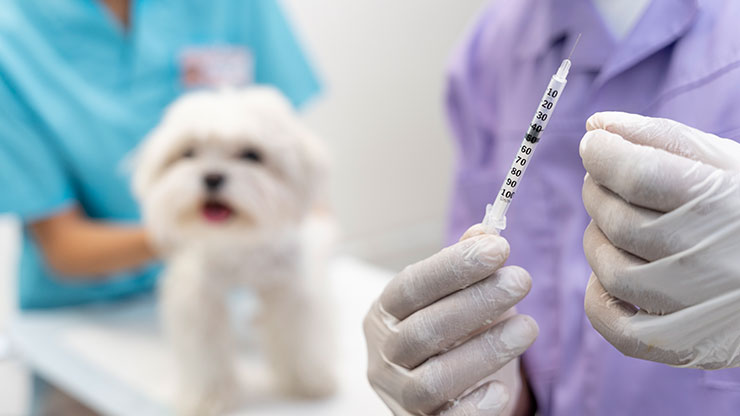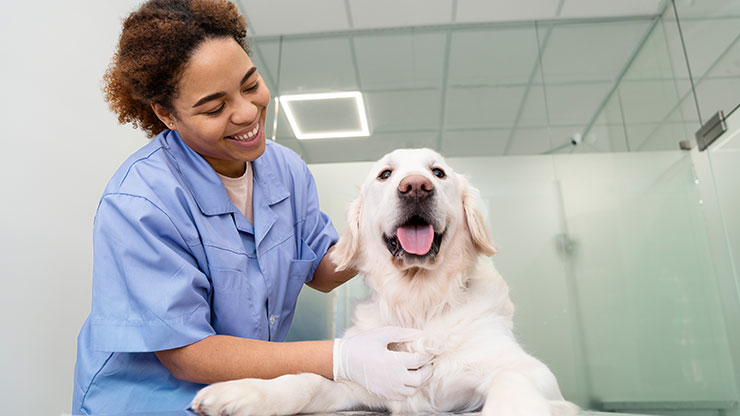
The Significance of Regular Veterinary Check-Ups for Dogs
Regular veterinary check-ups are not just routine appointments; they are a fundamental aspect of responsible pet ownership and animal welfare. These check-ups play a crucial role in not only maintaining your pet's health but also ensuring early disease detection and strengthening the bond between you and your furry companion. Let's find out more about the importance of regular veterinary check-ups.
Preventive Healthcare
Veterinarians can provide preventive care, such as vaccinations, deworming, and flea and tick control, during check-ups. These measures help protect pets from a range of diseases and parasites.
Preventive healthcare for dogs is a cornerstone of responsible pet ownership. It involves a proactive and holistic approach to maintaining a dog's health and well-being, focusing on preventing illnesses, parasites, and injuries before they occur. According to The Dogs Journal, Key components of preventive healthcare for dogs include regular veterinary check-ups, where vaccinations, dental care, and overall health assessments are administered. Proper nutrition, regular exercise, and weight management also play pivotal roles in keeping dogs healthy.
By prioritizing preventive healthcare for your furry companions, as a responsible dog owner, you not only ensure your pets lead longer, happier lives but also reduce the risk of expensive medical treatments down the road. It's a commitment to the lifelong health and happiness of our four-legged friends.
Early Disease Detection
Regular check-ups allow veterinarians to detect health issues in their early stages, often before symptoms become apparent. According to The Dogs Journal, this early detection can be crucial in preventing more serious and costly health problems down the road.
Veterinarians are trained to detect health issues in their early stages through a combination of clinical skills, diagnostic tools, and knowledge. Here's how they can identify problems before they become severe:
Physical Examination: Veterinarians conduct thorough physical examinations, checking for any abnormalities in a pet's appearance, behavior, and vital signs. Changes in posture, gait, body condition, or skin can be early indicators of health problems.
Medical History: Gathering a detailed medical history from the pet owner. Information about changes in appetite, activity levels, urination, and defecation patterns can provide important clues.
Diagnostic Tests: Veterinary clinics are equipped with various diagnostic tools, including blood tests, urinalysis, and imaging (X-rays, ultrasounds). These tests can reveal early signs of diseases like diabetes, kidney disease, or tumors.
Other important examinations: Other than these, vets also perform fecal examinations, dental examinations, and heart and lung auscultation. The status of vaccination and any change in behavior are also observed closely to make a conclusion.
Early detection of health issues allows veterinarians to initiate prompt treatment and management, often resulting in better outcomes and a higher quality of life for pets. It underscores the importance of regular preventive care and the strong bond between veterinarians, pet owners, and their beloved animals.

Vaccinations and Immunizations
Vaccinations play a critical role in protecting pet dogs from a wide range of diseases. Here's how they work and why they are essential:
Disease Prevention: Vaccines are designed to stimulate a dog's immune system to produce antibodies against specific diseases. When a dog is exposed to the actual pathogen in the future, these antibodies can quickly recognize and neutralize it, preventing the disease from taking hold.
Herd Immunity: Widespread vaccination of pets in a community creates herd immunity. This means that when a significant portion of the pet population is immune to a disease, it becomes less likely to spread, protecting even those dogs that cannot be vaccinated due to age, illness, or allergies.
Core and Non-Core Vaccines: Veterinarians administer core vaccines, such as those for rabies, distemper, parvovirus, and canine adenovirus, to all dogs because these diseases are highly contagious and often life-threatening. Non-core vaccines, like those for kennel cough or leptospirosis, are given based on a dog's lifestyle, geographic location, and individual risk factors.
Long-lasting Immunity: Many vaccines provide immunity that can last for several years or even a dog's entire life, depending on the disease and vaccine type. Booster shots are required periodically to maintain immunity.
Travel and Boarding: If you plan to travel with your dog or board them in a kennel, vaccinations are typically required. These measures protect your dog and others they may come into contact with.
While vaccinations are crucial for disease prevention, it's essential to work closely with your veterinarian to determine the appropriate vaccination schedule for your dog. They will consider your dog's age, health status, lifestyle, and local disease prevalence to create a tailored vaccination plan that maximizes protection while minimizing unnecessary vaccinations. Regular vaccination and preventive care are fundamental components of responsible pet ownership and contribute to a healthier and happier life for your canine companion.
Parasite Control
It's important to prevent and manage common parasites and various types of worms in pets by getting a range of services and treatments tailored to the specific needs of each animal.
To help in parasite prevention and management, a veterinarian would be doing the following.
Parasite Prevention Plans: Veterinarians develop customized parasite prevention plans for pets based on factors such as the pet's age, lifestyle, geographic location, and health status. This plan may include preventive medications, vaccinations, and lifestyle recommendations.
Flea and Tick Control: Veterinarians recommend and prescribe flea and tick preventives to protect pets from infestations. These products come in various forms, including spot-on treatments, oral medications, and collars. Regular use of these preventives helps keep pets and homes free from these pests.
Heartworm Prevention: Heartworm disease is a potentially fatal parasitic infection transmitted by mosquitoes. Veterinarians provide heartworm preventives, typically administered monthly, to ensure pets remain protected.
Internal Parasite Control: Regular deworming is essential to control internal parasites such as roundworms, tapeworms, and hookworms. Veterinarians prescribe deworming medications and establish schedules based on the pet's age and risk factors.
External Parasite Checks: During veterinary exams, veterinarians perform thorough examinations to check for external parasites like fleas, ticks, mites, and lice. Early detection allows for prompt treatment.
In accordance with veterinarians, pet owners can develop effective parasite prevention strategies and ensure their pets receive the appropriate treatments and preventive medications. Preventing and managing parasites not only protects the health and well-being of pets but also contributes to a safer and healthier environment for both animals and humans.
Other than these important factors, regular vet checkups also help in preparing your pet's customized care plan, detailed nutritional guidance based on several factors, behavioral assessments, and much more. It also helps you to identify age-related health issues if you have a senior dog.

Final Thoughts
The significance of regular veterinary check-ups for our beloved pets cannot be overstated. These routine visits are not merely a matter of compliance but a fundamental aspect of responsible pet ownership. By providing a proactive approach to monitoring and maintaining our animal companions' health, we extend their lifespans, improve their quality of life, and ensure their happiness.
Preventing, detecting, and managing health issues early is the cornerstone of pet wellness. It is the steadfast commitment of pet owners to prioritize these check-ups that ultimately fosters the strong bond of trust and care between humans and their four-legged family members. So, let us be unwavering in our dedication to regular vet check-ups, ensuring that our pets lead long, healthy, and fulfilling lives.
-----
Author Bio:
Sahir is a dedicated dog owner, a blogger, and the co-owner of The Dogs Journal.










